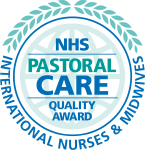Trac proudly powers the recruitment for
East Lancashire Hospitals NHS Trust

About
At East Lancashire Hospitals NHS Trust:
We provide high quality services for the local population of over half a million people across East Lancashire and the surrounding area.
- We employ over 9,500 staff, many of whom are internationally renowned and have won awards for their work.
- We treat nearly three quarters of a million patients a year from the most serious of emergencies to planned operations and procedures.
- We offer care across Three hospital sites, and various community sites, using state-of-the-art facilities.
In this section you’ll find information about our hospitals, the goals the Trust is working hard to achieve, the annual plan and reports on how we are performing.
We are always try to deliver the highest quality care to our patients and have ambitious plans to continue to improve the services we offer in response to the changing needs of our patients.
Background.
Contact
- Address
- Royal Blackburn Teaching Hospital
- Haslingden Road
- Blackburn
- Lancashire
- BB2 3HH
- Contact Number
- 01254732075
Login changes are coming
From July 2025 onwards, Multi-Factor Authentication (MFA) will be introduced to this site. This will add an extra step to the login process: a requirement to enter a One Time Passcode (OTP) upon login to minimise fraud and maintain security. See our summary page here for more details.
Major Trauma Rehabilitation Coordinator
Closed for applications on: 6-Apr-2024 00:00
Vacancy status: Closed
Closed for applications on: 6-Apr-2024 00:00
Key details
Location
- Site
- Royal Blackburn Hospital
- Address
- Haslingden Road
- Town
- Blackburn
- Postcode
- BB2 3HH
- Major / Minor Region
- Lancashire
Contract type & working pattern
- Contract
- Permanent
- Hours
- Full time - 37.5 hours per week
Salary
- Salary
- £50,952 - £57,349 per annum
- Salary period
- Yearly
- Grade
- (NHS AfC: Band 8a)
Specialty
- Main area
- Therapist
At East Lancashire Hospitals NHS Trust our vision is to be widely recognised for providing safe, personal and effective care. We currently provide high quality services and treat over 600,000 people across East Lancashire and the surrounding area. We employ over 9,500 staff, many of whom are internationally renowned and have won awards for their work.
Job overview
An exciting opportunity has arisen in the ELHT Major Trauma Service for two Major Trauma Rehabilitation Co-ordinators.
We are looking to appoint enthusiastic, experienced, and dynamic therapists with a passion for Major Trauma. Applications are invited from suitably qualified and experienced AHPs, with relevant clinical experience and ability to demonstrate specialist clinical knowledge and skills appropriate for Major Trauma.
This role is multi-faceted, incorporating expert clinical knowledge, service and pathway development, research, education, and leadership. You will be involved in the patients' journey from the emergency department to discharge and beyond, coordinating their management plans, interventions, and movement through services.
Working with multiple specialities you will ensure cohesion of care and shared decision making. You will be responsible for the completion of rehabilitation prescriptions within national guidelines, identifying rehabilitation needs early, actioning referrals and repatriations while ensuring equity and consistency in rehabilitation provision.
You will be intellectually flexible and be confident to challenge the status quo while building excellent working relationships. You will be a specialist resource for the management of Major Trauma patients admitted to the trust, providing expert rehabilitation advice and input.
Advert
Manage and facilitate the flow of trauma patients though the Trauma Unit. They will track and facilitate the trauma patient’s progress, providing specialist advice to support assessment, rehabilitation planning and implementation of care. Ensure all major trauma admissions are highlighted to the service. When overnight or at the weekend, this should occur at service resumption the next working day. Establish and maintain effective communication with various individuals and groups on highly complex potentially stressful topics, in a range of situations. Manage reverse transfers from the Major Trauma Centre back to the Trauma Unit. Links with senior team to influence capacity management for Trauma patients. Link with specialty teams i.e., medicine spinal teams, orthopaedics & neurosurgery to ensure that major trauma patients receive holistic care. Work closely with MDT in managing a caseload of patients who have sustained major trauma to ensure that all patients receive rehabilitation assessment and rehabilitation prescription in a timely manner and facilitate transfers to other services. Ensure that patients who have sustained Major Trauma have specialist assessment of need using validated rehabilitation assessment tools (e.g., NPDS, RCS)Link with Lancashire and South Cumbria rehabilitation networks, IRU’s, community teams, spinal injury units, and where appropriate develop links with other providers.
Working for our organisation
Established in 2003 East Lancashire Hospitals NHS Trust (ELHT) is a large integrated health care organisation providing high quality acute secondary healthcare for the people of East Lancashire and Blackburn with Darwen.
Our vision is to be widely recognised for providing safe, personal and effective care. We currently provide high quality services and treat over 700,000 patients a year from the most serious of emergencies to planned operations and procedures. We employ over 8,000 staff, many of whom are internationally renowned and have won awards for their work and achievements.
The Therapies and Orthotics directorate is driven by the trusts strategic objectives and values, alongside the new ELHT AHP Strategy and we look for people who are strongly aligned with them.
Detailed job description and main responsibilities
Major Trauma Rehabilitation Coordinator with responsibility for advancing evidence-based clinical practice in this specialty, across East Lancashire Health Care Trust. To exercise advanced clinical expertise, levels of judgement, discretion and decision making in clinical care demonstrated through the four pillars of Advanced Clinical Practice: Clinical skills, Leadership & Management, Research, and Education. This will be done in collaboration with AHP, medical and nursing colleagues.
Provide specialist clinical expertise (both within own professional clinical discipline and across the multidisciplinary therapy team), making evidence-based decisions with the patient about their rehabilitation post major trauma injuries. Practitioners will use their clinical-reasoning skills to undertake an assessment of the presenting problem, interpret findings, develop working and differential diagnoses, and formulate, communicate, and implement management plans that take account of individuals’ needs, goals and wishes, local service availability and relevant local, ICS and national guidelines and policies.
Enable individuals to make decisions about their care using the principles of shared decision making:Helping them to identify the priorities and outcomes that are important to them.Explaining in non-technical language all available options (including doing nothing)Exploring with them the risks, benefits, and consequences of each available option.Supporting them to decide on their preferred way forward.Deliver and promote programmes of supported patient self-management, in ways that facilitate behavioural change, optimise individuals' rehabilitation and fulfilment of personal goals and independence relevant to their major trauma injury.Provide clinical and strategic leadership within the multidisciplinary team, working with the leadership team, with responsibility for quality, training and clinical governance and research agendas.Monitor and lead improvements to standards of care through, supervision of practice, clinical audit, evidence-based practice, teaching and supporting professional colleagues and the provision of skilled professional leadership.Lead on the development and delivery of an education programme for AHP, nursing and medical colleagues across primary and secondary care staff and partner organisations focusing on the assessment and management of rehabilitation following a major trauma injury.
EXPERT CLINICAL PRACTICE:To be a clinical leader in the multidisciplinary delivery of major trauma management and rehabilitation, demonstrating advanced, expert knowledge and skills in interventions with patients and carers.Takes professional responsibility demonstrating high-level decision-making and clinical-reasoning skills in the assessment and rehabilitation of patients within relevant clinical speciality – both within own professional scope of practice and the holistic MDT.Manages a complex caseload with supervision/mentoring as required. This includes the gathering and synthesise of information on the nature of the individual’s presenting symptoms taking account of how these relate to relevant past medical history and investigations, developing and implementing rehabilitation and treatment plans based on best evidence, review and discharge planning.Request appropriate investigations based on their level of competence and interpret the findings to facilitate diagnosis and management plans of patients.To receive referrals from and make referrals to healthcare professionals review the patient and act, accordingly, thereby reducing length of time patients wait for intervention.According to current legislation to undertake independent prescribing and make appropriate use of the administration of medication using Patient Group Directions. Advise, initiate, evaluate and modify a range of interventions, which may include self-management and lifestyle advice, specialist therapies, social and independent prescribing.Record the information gathered through taking individuals’ history concisely and accurately for clinical management, and in compliance with local protocols, legal and professional requirements.Be accountable for their own decisions and actions and the outcomes of their interventions via appropriate professional body, supported by a professional culture of peer networking/review, reflective practice, and engagement in evidence-based practice.
COMMUNICATION AND KEY WORKING RELATIONSHIPS:Demonstrate effective person-centred communication skills, supporting people in making decisions, planning care or seeking to make positive changes, using a person-centred approach.Adapt how they engage with others (including those with communication, cognitive and sensory impairments) through using different verbal and non-verbal communication styles, and in ways that are responsive to individuals’ communication and language needs and preferences. Conveying information and discussing issues in ways that avoid jargon, negative descriptors, and assumptions.Ability to communicate complex clinical information both written and verbal, in an easily understood form, to patients, carers, and all members of the multi-disciplinary team.Ability to deal with difficult or distressed patients and carers, conveying difficult and sometimes unwelcome information relating to clinical issues.Demonstrate leadership, providing clinical and emotional support for staff working in high flow and demanding environments, including ED/Ambulatory care.Work collaboratively with an appropriate range of multi-agency and inter-professional resources, developing, maintaining, and evaluating links to manage risk and issues across organisations and settings.Advise on local non-clinical services that individuals and their carers may benefit from accessing to help manage their injuries, including those relating to employment, voluntary activities, counselling services and leisure facilities.Make appropriate referrals using appropriate documentation to other health and care professionals and agencies when this is in individuals’ best interests.Respect and draw on colleagues’ knowledge and expertise within the multi-disciplinary team and across pathways. Communicating with colleagues in ways that build and sustain relationships, seeking, gathering, and sharing information appropriately, efficiently, and effectively to expedite and integrate individuals’ care.Participate as an effective team member and understand the importance of effective team dynamics. Contributing effectively to multi-disciplinary team activity (including service delivery processes and learning and development).Facilitate collaboration and close working relationships with all services engaged in delivery of major trauma care.
LEADERSHIP AND MANAGEMENT:Develop and implement robust governance systems based on an understanding of the level of practice required to deliver the service and assure safe quality standards of practice for service users.Ensure that practice is carried out in accordance with professional rules of conduct, professional standards, departmental and Trust policies, national policies and guidelines and statute.Lead new practice and service redesign solutions in response to feedback, evaluation and need.Act as a clinical role model, educator, coach, and mentor seeking to instil and develop the confidence of the workforce.Develop and initiate systems to collect feedback and involvement from individuals, families, carers, communities, and colleagues to assure and improve the quality of care and service delivery.Work with the major trauma leads on the monitoring of complaints, incidents, and patient/service user outcomes and feedback.Demonstrate receptiveness to challenge and preparedness to constructively challenge others, dealing with concerns that affect individual patients, colleagues and overall service safety and quality.To lead the development of relevant policies and clinical protocols in major trauma and be responsible for policy implementation and service development.Negotiate a personal and individual scope of practice for staff to operate within legal, ethical, professional, and organisational policies, governance and procedures, with a focus on managing risk and upholding safety.Demonstrates an awareness of their own limitations and through this, recognise the parameters of their scope of practice.Represent ELHT on relevant committees and meetings, as a lead clinician, provide input in relation to specialist issues and clinical matters as required at a local and regional level.Act as an advocate for and contribute to a culture of organisational learning to inspire and develop future and existing staff.
EDUCATION, LEARNING AND DEVELOPMENT:Lead on the development and delivery of an education programme for all staff working with people post major trauma injuries, in primary and secondary care and the third sector to improve the rehabilitation offer and understanding of conditions.Develop a strategy for training of the MDT working with major trauma patients to develop the knowledge and skills necessary for succession planning, creating a sustainable workforce within the organisation.Provide professional clinical leadership through actively engaging in peer review to inform own and other’s practice, formulating and implementing strategies to act on learning and make improvements.To maintain own continuing professional development (CPD) by engaging in self-directed learning, using a process of critical reflection to identify learning needs to maximise clinical skills and knowledge.Maintain a portfolio of evidence or work-based learning showing how you meet all the required capabilities for working in this role.Take a lead role in implementing a competency and capability framework, inspiring the wider MDT to develop competencies and capabilities through provision of work-based and inter-professional learning opportunities.
Dear Potential Applicant,
It is important you are made aware of the following as regards your application to East Lancashire Hospitals NHS Trust
- Please note that the salary advertised is for full time hours. If this post is less than 37.5 hours per week, the salary will be pro-rata. For posts on Agenda for Change pay-scales, new entrants to the NHS will normally commence on the first pay point of the relevant band.
- This vacancy may close before the closing date if the recruiting manager deems sufficient applications have been received. Therefore it is advised to complete your application as early as possible to avoid disappointment.
- Please ensure you check the email account from which you apply regularly as we will use this to contact you regarding your application.
- Please note that shortlisting is completed anonymously with candidates being assessed against the essential criteria for the post. Therefore only applicants, who can clearly demonstrate how they meet our person specification criteria in their application, will be short-listed.
Disclosure and Barring Scheme (DBS)
If the role you are applying for is identified as either controlled or regulated activity as defined in in the Safeguarding vulnerable Groups Act (2006) any offer of employment is provisional upon a satisfactory DBS check being obtained.
The healthcare sector is exempted from the Rehabilitation of Offenders Act 1974.
In line with other NHS organisations in the North West Region, the Trust is now passing the charge for undertaking a DBS check on to candidates in the event they are successfully appointed into the post for which they have applied. Candidates can choose whether to pay this over 1-3 months as a deduction from the monthly salary. However, if you are applying for a post as a BANK worker, the payment must be made in full at the time of employment checks. By applying for this vacancy you are agreeing to this undertaking in the event you are successfully appointed.
The cost of an Enhanced Disclosure will be £55.38 and for a Standard Disclosure will be £27.38.
This cost is not applicable for a Volunteer post
------------------------------------------------------------------------------------------------------------
The Trust is an equal opportunities employer, committed to improving the working lives of our staff and operates a 'Zero Tolerance' policy to aggression, violence, bullying and harassment. In addition, our aim is to help protect children and vulnerable adults by providing a first-class service to the recruitment of people into positions of trust.
We aim to employ a workforce that reflects the diverse communities we serve.
We welcome applications from everyone irrespective of ethnic origin, gender, age, gender identity, sexual orientation, religion, marital status, disability or social background.
We especially welcome applications from members of our black, Asian and minority ethnic (BAME) communities, as we have identified that ELHT has an under-representation of BAME employees. Appointments will be made on merit.
Applicants who have a disability and meet the essential criteria for the job will be interviewed if you indicate you wish to be considered under the Guaranteed Interview Scheme.
If you require a reasonable adjustment at any stage of the recruitment process please make the recruitment services team aware as soon as possible. By telephone 01254 732075 or email [email protected] or write to Employment Services, Parkview Offices, Haslingden Road, Blackburn, BB2 3HH
Applicant requirements
Person specification
Qualifications
Essential criteria
- Profession specific Degree/ Diploma
- Health & Care Professions Council Registration (HCPC)
- Other courses, eg: Leadership
Desirable criteria
- Member of Chartered Society of Physiotherapy or equivalent
- Appropriate post graduate clinical courses linked to specialty: Major Trauma and rehabilitation
- Appropriate post graduate clinical courses linked to specialty: Non-Medical Prescribers
- Appropriate post graduate clinical courses linked to specialty: MSc in relevant speciality
Experience
Essential criteria
- Adequate proven level of post-registration experience
- Adequate proven level of major trauma experience at Band 7 level
- General experience, including: Orthopaedics, Surgery, Critical Care, Paediatrics, Elderly, Respiratory Care, Neurology
Further details / informal visits contact
- Name
- Rebecca Hope
- Job title
- Clinical/Operational Lead Surgery/Therapies
- Email address
- [email protected]
- Telephone number
- 01524 734433
No longer accepting applications
Sorry, this vacancy is no longer accepting applications.
You can search for similar jobs on the employer's job board, or visit our national jobs board Health Jobs UK.




